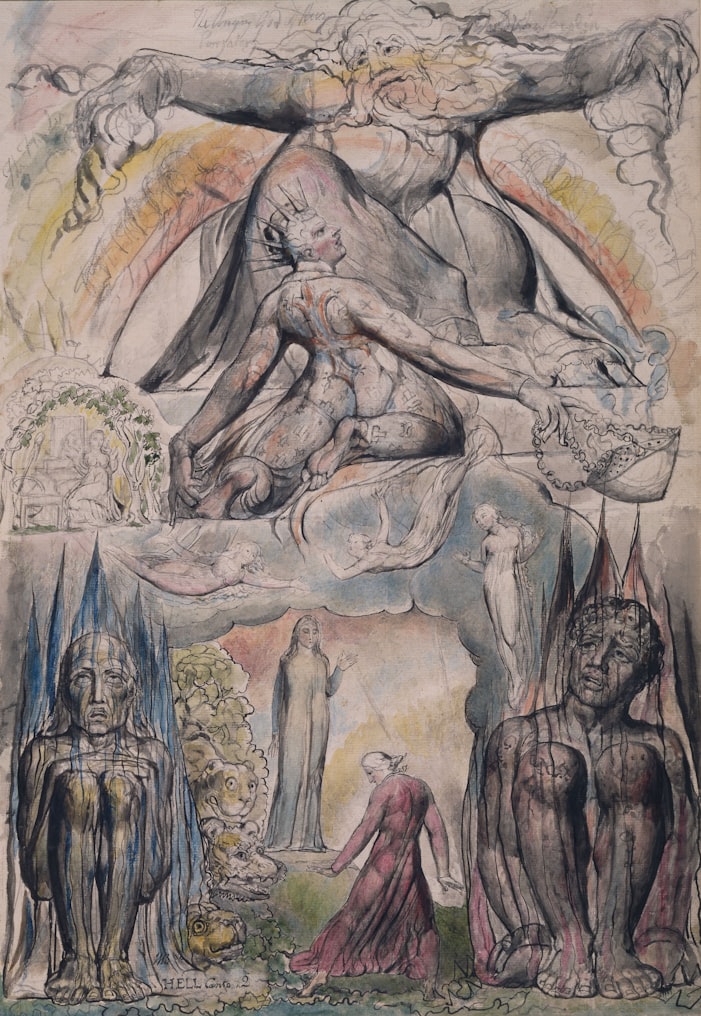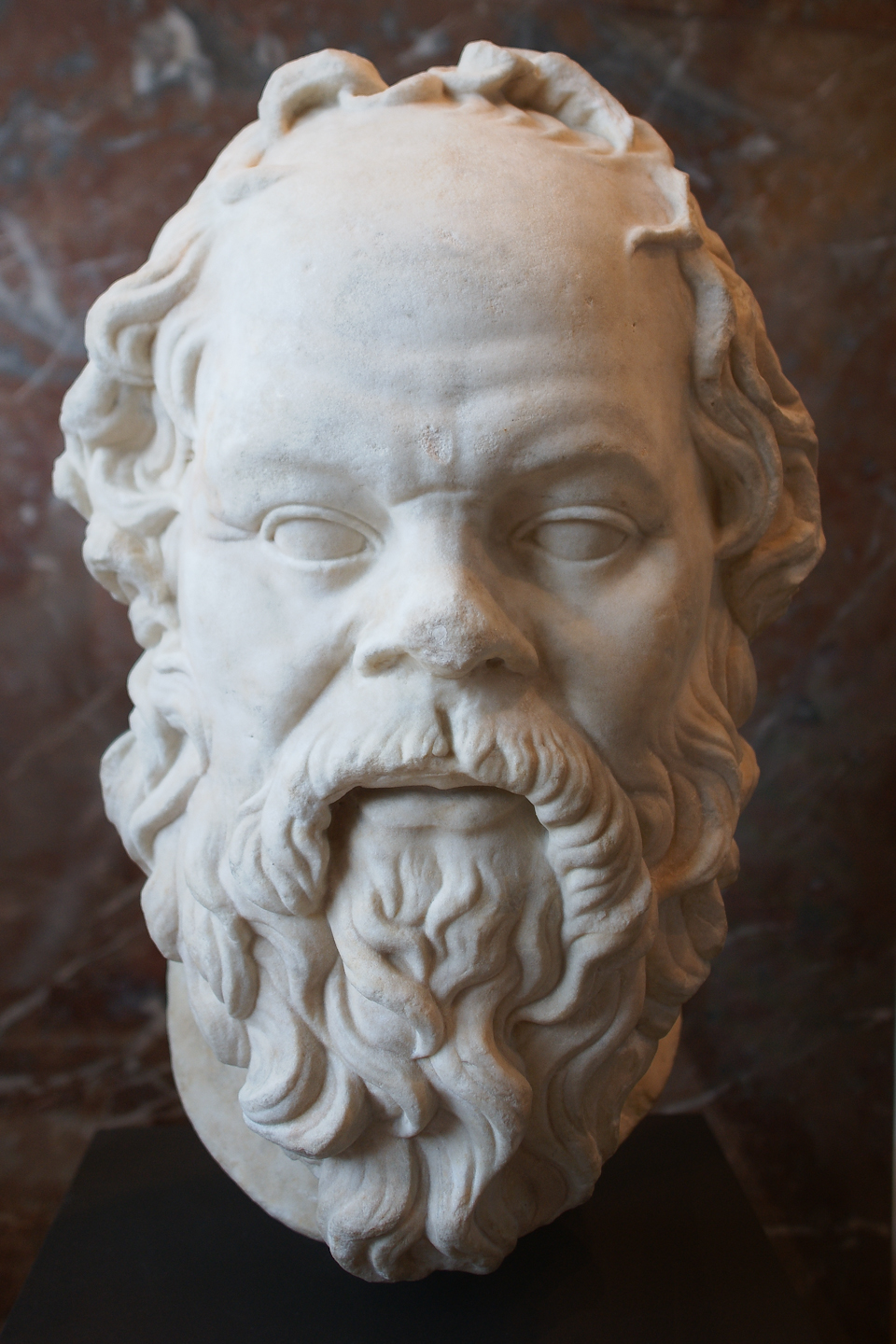EDUCATION, PHILOSOPHY
Teaching to the Un-Goal
1 October 2021
In my last of 35 years teaching US public high school students language arts, I had an exchange with a young man who insisted that the questions he considered were unimportant in contrast to the grade I assigned him. When I gently suggested that–practically speaking–his skills in critical thinking were of more value than 10 or 15 points earned on a composition at age 16, he self-righteously scoffed at the notion. It was hardly a unique conversation in the course of my career–indeed, it was quite common–for as a system of schooling we have quite effectively separated “real world” utility from idea-making and found the latter incidental to success.
This separation of the inward and outward, of the personal and objective, of inquiry and response, exists as a “space” in the thinking of philosophers and artists across humanity. Socrates decried the routine assumptions of Greeks when he posed his questions, all the while seeking a truth he might never articulate. Soren Kierkegaard left such spaces in his own philosophy, revealing that the uncertainty–the aporia–which remains from critical inquiry is in fact a virtue and necessity to growth. It is perhaps from two such thinkers that I might better reflect the nature of better learning and teaching: that is, that the role of teachers is neither to direct nor guide students to predetermined answers but to lovingly abandon them to a space of critical uncertainty.

It is easy (and dangerous) enough to generalize about the historical structure and frameworks of institutional schooling. Teachers are resolved to bring students to predetermined goals of instruction (and are merited by that standard). These goals are objectively measured by standardized assessments, tests or otherwise. Behavior modification is a part of this framework, as well, but mostly insofar as it leads to the prescribed results. [While counselors rightfully call for more attention to social-emotional learning (SEL), for instance, districts “buy into” these strategies usually when it becomes clear that not doing so will impact test scores.] The general approach to instruction might be written as:
Knowledge → Process → Response
Students are given (or receive) some set of skills or facts, are led through a framework to process them, and are expected to arrive at a solution at the end of the process. Given a set of variables, students choose a mathematical or scientific process and find the right answer. Given a set of historical dates, students are shown cause-effect sequences, and then they repeat back or demonstrate a parallel case. Given a set of organizational writing skills, students write through a process of drafting and revision to arrive at a final product in the prescribed form: the content of said essay is rarely of importance. It might be an analysis of a political candidate or a self-analysis of a personal trauma; the success, however, is in the syntax. (Design cycles attempt to open this, but ultimately these become closed measured works, appropriated by the educational system.) As these young people grow and test their own identities, we award them points for demonstrating this sequence. They have effectively learned to separate their personal idea for the universal one praised by the school; they separate imagination from the utility of economic exchange: behavior for social and economic credit.
“There is a certain fragile level of comfort which comes with answers prescribed by formula.“
There is a certain fragile level of comfort which comes with answers prescribed by formula. We receive social credit, we are praised for “confidence,” we fit in. Yet it only requires a certain level of Socratic ironyA "deflection of expectation," where words, situation, or pe... More to break that self-assuredness, to question the hypocritical foundations upon which the presumption rests. Generalized or objective truths ever seem to find their way to error when a new circumstance arises. Empiricism slips when applied to the non-physical world; historical narratives are ever-simplified to author their thematic lessons; and sometimes the thesis sentence simply does not belong to a non-inductive inquiry. Kierkegaard would describe it this way: “IronyA "deflection of expectation," where words, situation, or pe... More is a quality of subjectivity” (Kierkegaard, Concept of IronyA "deflection of expectation," where words, situation, or pe... More 262).
Right away, however, agents for the status quo shift uncomfortably. “The subjective is not measurable!” “Relativism is chaos!” “Nihilism will question the foundations of education itself!” It surprises no one that Socrates was executed for these very worries. How dare he suggest that he has a “divine faculty of which the internal oracle is the source” (Apology in West)? His knowledge comes from within? And he used it to suggest a student follow his own personal ambitions rather than those of his family? Kierkegaard’s conception, too, seems fraught for anything resembling an institution for general education. There can be nothing general about a personal daemon (from which we would later derive “demon”).
These two thinkers were hardly alone, of course. When we begin to examine those who make anti-institutional ideology a part of their discourse we most often meet accusations of anarchy. William Blake wrote:
I must Create a System, or be enslav’d by another Man’s.
I will not Reason & Compare: my business is to Create. (“Jerusalem”)
But he “was often called mad in his lifetime” (Frye 12). Godwin and Proudhon would father “individualist anarchism” as philosophies and consequently have their sanity questioned. Even so, it is worth noting that the goal of these thinkers is to free humanity from the limitations (or oppression) of institutional (pragmatic, objective, empirically-reasoned) captivity. Kierkegaard’s hope was plain enough: “In ironyA "deflection of expectation," where words, situation, or pe... More, however, since everything is shown to be vanity, the subject becomes free” (Kierkegaard, Concept of IronyA "deflection of expectation," where words, situation, or pe... More 258).
“If we can cast enough aspersions upon anarchy, we need not examine overlong the conservative status quo which pretends objective reality and demands socially-prescribed responses.“
So what does it require to educate students out of their captivity to a “safe” and rewarded but unsound and limiting utilitarianism? Am I now arguing that relativism and nihilism are valuable despite the anarchic consequences? No. I believe, as did Socrates and Kierkegaard, that we have set up a false dichotomy. It is, however, a binary that serves the advocates for institutional schooling well. If we can cast enough aspersions upon anarchy, we need not examine overlong the conservative status quo which pretends objective reality and demands socially-prescribed responses. This is not a “two roads diverged in a yellow wood” metaphor, even though Frost also believed but one path was possible.
First, let us dispose of the notion of roads or paths in any event. Schooling would have us take a journey to the destination of employment success, but education need not have merely a socially-prescribed goal. Socrates challenges his fellow citizens for the same reasons as Kierkegaard for the same reason as Blake and the best teachers: to build a better humanity. And humanity finds itself at its best when it exercises the single skill which distinguishes it from animals: the ability to choose. But choice itself has a few prerequisites, the first being an ability to see and understand the choices before us. On the one hand, we have the unreflective and comfortable status quo of measured objective truth; on the other, we have the delusional and anti-establishment random anarchy of personal belief: neither seems particularly healthy.

But here is where Socrates and Kierkegaard open the choices for learning. The ironyA "deflection of expectation," where words, situation, or pe... More, the critical inquiry, the questions, lead to doubt, to uncertainty, to aporia. It is a strategy of critical and open discourse; self-aware and appropriated subjective knowledge, a continuing dialectic of reflection and immersion, skepticism and revision. In these spaces Kierkegaard finds his faith, not a certainty because of (as the clergy frame the process of belief in God through Reason) but a determination in spite of. In these spaces, in our continuing applications of idea to reality, we test and fail, challenge and author. And suddenly we find that the narratives of history shift with a change of perspective, that science proceeds also with questions not just of How but Should, that the Idea of composition becomes as or more vital than the form which presents it.
As an educator, this is not a direction I can point to but a state of mind which I might provoke. There are, not sadly, no quizzes or codes of conduct which can measure it. Provocations are sometimes painful, often controversial, rarely welcomed. Caught up in the captivity of institutional comfort and predictability–Kierkegaard will derisively call it “Certainty,” Socrates “truth” in the lower case, and Blake “Reason”–few will wish to leave willingly. Nonetheless we are left with few choices that so serve our humanity, this living with contradiction, this acceptance of what I believe despite, this constant challenging of myself.
And the institution of schooling will not take us there.
Wanderer, your footsteps are the road, and nothing more; wanderer, there is no road, the road is made by walking. By walking one makes the road, and upon glancing behind one sees the path that never will be trod again. Wanderer, there is no road — Only wakes upon the sea.
—Antonio Machado, Campos de Castilla, “86 Proverbs and Songs, XXIX”
Works Cited
Blake, William. “Jerusalem.” The Complete Poetry and Prose of William Blake. David Erdman, editor. New York: Doubleday, 1988.
Frye, Northrop. Fearful Symmetry: A Study of William Blake. Princeton University Press, 1969.
Kierkegaard, Soren. The Concept of IronyA "deflection of expectation," where words, situation, or pe... More. Princeton University Press, n.d.
Machado, Antonio. Campos de Castilla. 30 October 2017. PDF. https://silo.tips/download/antonio-machado-campos-de-castilla-patrick-h-sheerin-translated-with-introductio.
West, Thomas G., 1945-. Plato’s “Apology of Socrates”: an Interpretation, with a New Translation. Ithaca, N.Y. :Cornell University Press, 1979.










Recent Comments